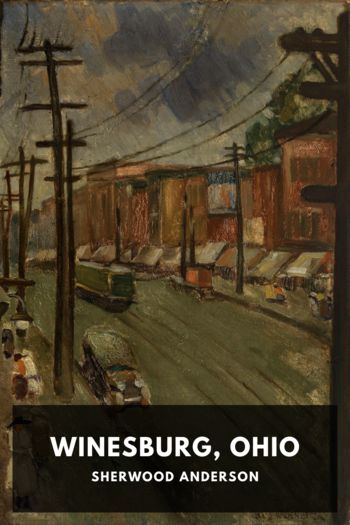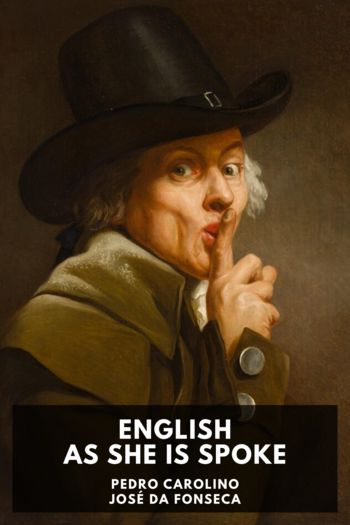Winesburg, Ohio, Sherwood Anderson [web based ebook reader txt] 📗

- Author: Sherwood Anderson
Book online «Winesburg, Ohio, Sherwood Anderson [web based ebook reader txt] 📗». Author Sherwood Anderson
They crossed a bridge that ran over a tiny stream and passed another vacant lot in which corn grew. The street ended. In the path at the side of the road they were compelled to walk one behind the other. Will Overton’s berry field lay beside the road and there was a pile of boards. “Will is going to build a shed to store berry crates here,” said George and they sat down upon the boards.
When George Willard got back into Main Street it was past ten o’clock and had begun to rain. Three times he walked up and down the length of Main Street. Sylvester West’s Drug Store was still open and he went in and bought a cigar. When Shorty Crandall the clerk came out at the door with him he was pleased. For five minutes the two stood in the shelter of the store awning and talked. George Willard felt satisfied. He had wanted more than anything else to talk to some man. Around a corner toward the New Willard House he went whistling softly.
On the sidewalk at the side of Winney’s Dry Goods Store where there was a high board fence covered with circus pictures, he stopped whistling and stood perfectly still in the darkness, attentive, listening as though for a voice calling his name. Then again he laughed nervously. “She hasn’t got anything on me. Nobody knows,” he muttered doggedly and went on his way.
Godliness A Tale in Four Parts Part IThere were always three or four old people sitting on the front porch of the house or puttering about the garden of the Bentley farm. Three of the old people were women and sisters to Jesse. They were a colorless, soft-voiced lot. Then there was a silent old man with thin white hair who was Jesse’s uncle.
The farmhouse was built of wood, a board outer-covering over a framework of logs. It was in reality not one house but a cluster of houses joined together in a rather haphazard manner. Inside, the place was full of surprises. One went up steps from the living room into the dining room and there were always steps to be ascended or descended in passing from one room to another. At meal times the place was like a beehive. At one moment all was quiet, then doors began to open, feet clattered on stairs, a murmur of soft voices arose and people appeared from a dozen obscure corners.
Besides the old people, already mentioned, many others lived in the Bentley house. There were four hired men, a woman named Aunt Callie Beebe, who was in charge of the housekeeping, a dull-witted girl named Eliza Stoughton, who made beds and helped with the milking, a boy who worked in the stables, and Jesse Bentley himself, the owner and overlord of it all.
By the time the American Civil War had been over for twenty years, that part of Northern Ohio where the Bentley farms lay had begun to emerge from pioneer life. Jesse then owned machinery for harvesting grain. He had built modern barns and most of his land was drained with carefully laid tile drain, but in order to understand the man we will have to go back to an earlier day.
The Bentley family had been in Northern Ohio for several generations before Jesse’s time. They came from New York State and took up land when the country was new and land could be had at a low price. For a long time they, in common with all the other Middle Western people, were very poor. The land they had settled upon was heavily wooded and covered with fallen logs and underbrush. After the long hard labor of clearing these away and cutting the timber, there were still the stumps to be reckoned with. Plows run through the fields caught on hidden roots, stones lay all about, on the low places water gathered, and the young corn turned yellow, sickened and died.
When Jesse Bentley’s father and brothers had come into their ownership of the place, much of the harder part of the work of clearing had been done, but they clung to old traditions and worked like driven animals. They lived as practically all of the farming people of the time lived. In the spring and through most of the winter the highways leading into the town of Winesburg were a sea of mud. The four young men of the family worked hard all day in the fields, they ate heavily of coarse, greasy food, and at night slept like tired beasts on beds of straw. Into their lives came little that was not coarse and brutal and outwardly they were themselves coarse and brutal. On Saturday afternoons they hitched a team of horses to a three-seated wagon and went off to town. In town they stood about the stoves in the stores talking to other farmers or to the store keepers. They were dressed in overalls and in the winter wore heavy coats that were flecked with mud. Their hands as they stretched them out to the heat of the stoves were cracked and red. It was difficult for them to talk and so they for the most part kept silent. When they had bought meat, flour, sugar, and salt, they went into one of the Winesburg saloons and drank beer. Under the influence of drink the naturally strong lusts of their natures, kept suppressed by the heroic labor of breaking up new ground, were released. A kind of crude and animal-like poetic fervor took possession of them. On the road home they stood up on the wagon seats and shouted at the stars. Sometimes they fought long and bitterly and at other times they broke forth into songs. Once Enoch Bentley, the older one of the boys, struck his father, old Tom Bentley, with the butt of a teamster’s whip, and the old man seemed





Comments (0)